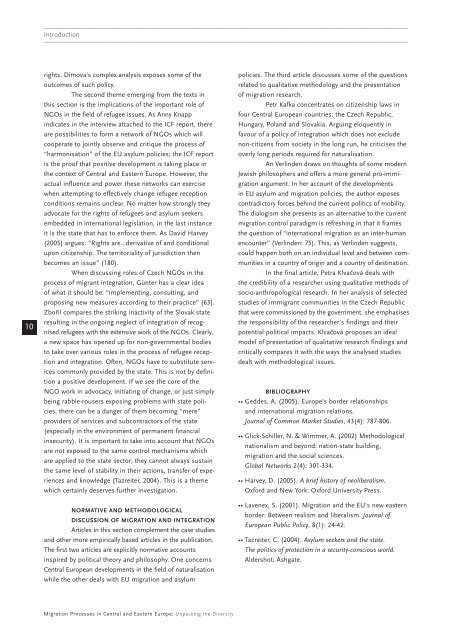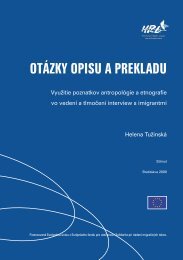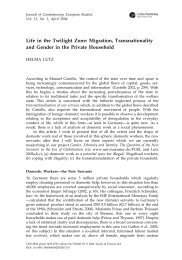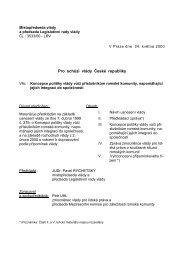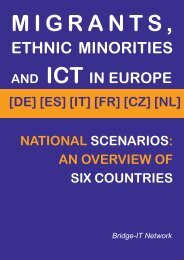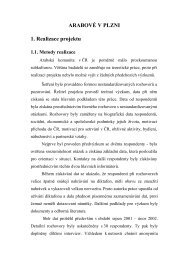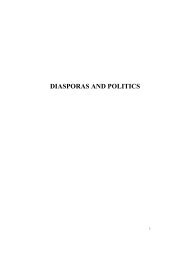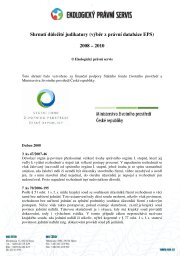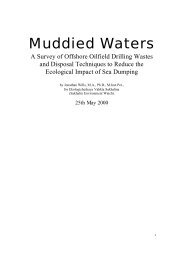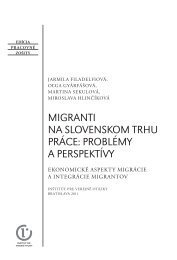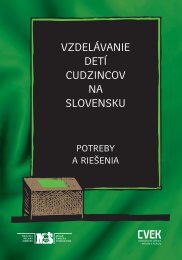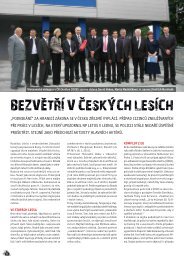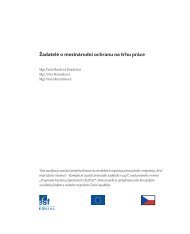Migration Processes in Central and Eastern Europe - Multiple Choices
Migration Processes in Central and Eastern Europe - Multiple Choices
Migration Processes in Central and Eastern Europe - Multiple Choices
Create successful ePaper yourself
Turn your PDF publications into a flip-book with our unique Google optimized e-Paper software.
———————————————————————————————————————————————————————————————<br />
Introduction<br />
———————————————————————————————————————————————————————————————<br />
10<br />
rights. Dimova's complex analysis exposes some of the<br />
outcomes of such policy.<br />
The second theme emerg<strong>in</strong>g from the texts <strong>in</strong><br />
this section is the implications of the important role of<br />
NGOs <strong>in</strong> the field of refugee issues. As Anny Knapp<br />
<strong>in</strong>dicates <strong>in</strong> the <strong>in</strong>terview attached to the ICF report, there<br />
are possibilities to form a network of NGOs which will<br />
cooperate to jo<strong>in</strong>tly observe <strong>and</strong> critique the process of<br />
“harmonisation” of the EU asylum policies; the ICF report<br />
is the proof that positive development is tak<strong>in</strong>g place <strong>in</strong><br />
the context of <strong>Central</strong> <strong>and</strong> <strong>Eastern</strong> <strong>Europe</strong>. However, the<br />
actual <strong>in</strong>fluence <strong>and</strong> power these networks can exercise<br />
when attempt<strong>in</strong>g to effectively change refugee reception<br />
conditions rema<strong>in</strong>s unclear. No matter how strongly they<br />
advocate for the rights of refugees <strong>and</strong> asylum seekers<br />
embedded <strong>in</strong> <strong>in</strong>ternational legislation, <strong>in</strong> the last <strong>in</strong>stance<br />
it is the state that has to enforce them. As David Harvey<br />
(2005) argues: “Rights are…derivative of <strong>and</strong> conditional<br />
upon citizenship. The territoriality of jurisdiction then<br />
becomes an issue” (180).<br />
When discuss<strong>in</strong>g roles of Czech NGOs <strong>in</strong> the<br />
process of migrant <strong>in</strong>tegration, Günter has a clear idea<br />
of what it should be: “implement<strong>in</strong>g, consult<strong>in</strong>g, <strong>and</strong><br />
propos<strong>in</strong>g new measures accord<strong>in</strong>g to their practice” (63).<br />
Zbořil compares the strik<strong>in</strong>g <strong>in</strong>activity of the Slovak state<br />
result<strong>in</strong>g <strong>in</strong> the ongo<strong>in</strong>g neglect of <strong>in</strong>tegration of recognised<br />
refugees with the extensive work of the NGOs. Clearly,<br />
a new space has opened up for non-governmental bodies<br />
to take over various roles <strong>in</strong> the process of refugee reception<br />
<strong>and</strong> <strong>in</strong>tegration. Often, NGOs have to substitute services<br />
commonly provided by the state. This is not by def<strong>in</strong>ition<br />
a positive development. If we see the core of the<br />
NGO work <strong>in</strong> advocacy, <strong>in</strong>itiat<strong>in</strong>g of change, or just simply<br />
be<strong>in</strong>g rabble-rousers expos<strong>in</strong>g problems with state policies,<br />
there can be a danger of them becom<strong>in</strong>g “mere”<br />
providers of services <strong>and</strong> subcontractors of the state<br />
(especially <strong>in</strong> the environment of permanent f<strong>in</strong>ancial<br />
<strong>in</strong>security). It is important to take <strong>in</strong>to account that NGOs<br />
are not exposed to the same control mechanisms which<br />
are applied to the state sector; they cannot always susta<strong>in</strong><br />
the same level of stability <strong>in</strong> their actions, transfer of experiences<br />
<strong>and</strong> knowledge (Tazreiter, 2004). This is a theme<br />
which certa<strong>in</strong>ly deserves further <strong>in</strong>vestigation.<br />
NORMATIVE AND METHODOLOGICAL<br />
DISCUSSION OF MIGRATION AND INTEGRATION<br />
Articles <strong>in</strong> this section complement the case studies<br />
<strong>and</strong> other more empirically based articles <strong>in</strong> the publication.<br />
The first two articles are explicitly normative accounts<br />
<strong>in</strong>spired by political theory <strong>and</strong> philosophy. One concerns<br />
<strong>Central</strong> <strong>Europe</strong>an developments <strong>in</strong> the field of naturalisation<br />
while the other deals with EU migration <strong>and</strong> asylum<br />
policies. The third article discusses some of the questions<br />
related to qualitative methodology <strong>and</strong> the presentation<br />
of migration research.<br />
Petr Kafka concentrates on citizenship laws <strong>in</strong><br />
four <strong>Central</strong> <strong>Europe</strong>an countries: the Czech Republic,<br />
Hungary, Pol<strong>and</strong> <strong>and</strong> Slovakia. Argu<strong>in</strong>g eloquently <strong>in</strong><br />
favour of a policy of <strong>in</strong>tegration which does not exclude<br />
non-citizens from society <strong>in</strong> the long run, he criticises the<br />
overly long periods required for naturalisation.<br />
An Verl<strong>in</strong>den draws on thoughts of some modern<br />
Jewish philosophers <strong>and</strong> offers a more general pro-immigration<br />
argument. In her account of the developments<br />
<strong>in</strong> EU asylum <strong>and</strong> migration policies, the author exposes<br />
contradictory forces beh<strong>in</strong>d the current politics of mobility.<br />
The dialogism she presents as an alternative to the current<br />
migration control paradigm is refresh<strong>in</strong>g <strong>in</strong> that it frames<br />
the question of “<strong>in</strong>ternational migration as an <strong>in</strong>ter-human<br />
encounter” (Verl<strong>in</strong>den: 75). This, as Verl<strong>in</strong>den suggests,<br />
could happen both on an <strong>in</strong>dividual level <strong>and</strong> between communities<br />
<strong>in</strong> a country of orig<strong>in</strong> <strong>and</strong> a country of dest<strong>in</strong>ation.<br />
In the f<strong>in</strong>al article, Petra Klvačová deals with<br />
the credibility of a researcher us<strong>in</strong>g qualitative methods of<br />
socio-anthropological research. In her analysis of selected<br />
studies of immigrant communities <strong>in</strong> the Czech Republic<br />
that were commissioned by the government, she emphasises<br />
the responsibility of the researcher's f<strong>in</strong>d<strong>in</strong>gs <strong>and</strong> their<br />
potential political impacts. Klvačová proposes an ideal<br />
model of presentation of qualitative research f<strong>in</strong>d<strong>in</strong>gs <strong>and</strong><br />
critically compares it with the ways the analysed studies<br />
dealt with methodological issues.<br />
BIBLIOGRAPHY<br />
•• Geddes, A. (2005). <strong>Europe</strong>'s border relationships<br />
<strong>and</strong> <strong>in</strong>ternational migration relations.<br />
Journal of Common Market Studies, 43(4): 787-806.<br />
•• Glick-Schiller, N. & Wimmer, A. (2002) Methodological<br />
nationalism <strong>and</strong> beyond: nation-state build<strong>in</strong>g,<br />
migration <strong>and</strong> the social sciences.<br />
Global Networks 2(4): 301-334.<br />
•• Harvey, D. (2005). A brief history of neoliberalism.<br />
Oxford <strong>and</strong> New York: Oxford University Press.<br />
•• Lavenex, S. (2001). <strong>Migration</strong> <strong>and</strong> the EU's new eastern<br />
border: Between realism <strong>and</strong> liberalism. Journal of<br />
<strong>Europe</strong>an Public Policy, 8(1): 24-42.<br />
•• Tazreiter, C. (2004). Asylum seekers <strong>and</strong> the state.<br />
The politics of protection <strong>in</strong> a security-conscious world.<br />
Aldershot: Ashgate.<br />
<strong>Migration</strong> <strong>Processes</strong> <strong>in</strong> <strong>Central</strong> <strong>and</strong> <strong>Eastern</strong> <strong>Europe</strong>: Unpack<strong>in</strong>g the Diversity


